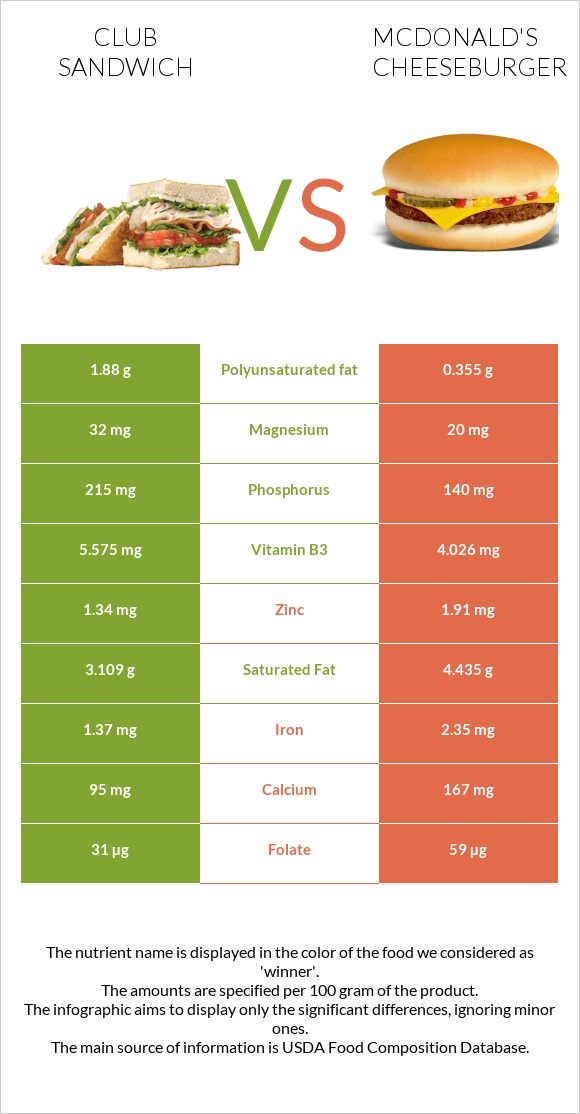Club sandwich vs. McDonald's cheeseburger — In-Depth Nutrition Comparison
Compare
The main differences between club sandwich and mcDonald's cheeseburgers
- Club sandwich has more phosphorus and vitamin B3; however, mcDonald's cheeseburgers have more vitamin B12, iron, calcium, folate, vitamin B2, and zinc.
- Daily need coverage for vitamin B12 for mcDonald's cheeseburgers is 16% higher.
- McDonald's cheeseburgers have 2 times less magnesium than club sandwich. Club sandwich has 32mg of magnesium, while mcDonald's cheeseburgers have 20mg.
- Club sandwich is lower in saturated fat.
Food types used in this article are Fast foods, grilled chicken, bacon, and tomato club sandwich, with cheese, lettuce, and mayonnaise and McDONALD'S, Cheeseburger.
Infographic

Infographic link
Mineral Comparison
Mineral comparison score is based on the number of minerals by which one or the other food is richer. The "coverage" charts below show how much of the daily needs can be covered by 300 grams of the food.
| Contains more MagnesiumMagnesium | +60% |
| Contains more PotassiumPotassium | +13% |
| Contains more PhosphorusPhosphorus | +53.6% |
| Contains more SeleniumSelenium | +∞% |
| Contains more CalciumCalcium | +75.8% |
| Contains more IronIron | +71.5% |
| Contains more ZincZinc | +42.5% |
Vitamin Comparison
Vitamin comparison score is based on the number of vitamins by which one or the other food is richer. The "coverage" charts below show how much of the daily needs can be covered by 300 grams of the food.
| Contains more Vitamin CVitamin C | +633.3% |
| Contains more Vitamin AVitamin A | +∞% |
| Contains more Vitamin EVitamin E | +∞% |
| Contains more Vitamin DVitamin D | +∞% |
| Contains more Vitamin B3Vitamin B3 | +38.5% |
| Contains more Vitamin B5Vitamin B5 | +∞% |
| Contains more Vitamin B6Vitamin B6 | +∞% |
| Contains more Vitamin KVitamin K | +∞% |
| Contains more Vitamin B1Vitamin B1 | +29.7% |
| Contains more Vitamin B2Vitamin B2 | +39.8% |
| Contains more Vitamin B12Vitamin B12 | +83% |
| Contains more FolateFolate | +90.3% |
All nutrients comparison - raw data values
| Nutrient |  |
 |
DV% diff. |
| Selenium | 24.8µg | 45% | |
| Vitamin B6 | 0.296mg | 23% | |
| Vitamin B5 | 0.826mg | 17% | |
| Vitamin B12 | 0.47µg | 0.86µg | 16% |
| Iron | 1.37mg | 2.35mg | 12% |
| Phosphorus | 215mg | 140mg | 11% |
| Manganese | 0.23mg | 10% | |
| Vitamin B3 | 5.575mg | 4.026mg | 10% |
| Polyunsaturated fat | 1.88g | 0.355g | 10% |
| Choline | 47.8mg | 9% | |
| Protein | 17.19g | 12.97g | 8% |
| Calcium | 95mg | 167mg | 7% |
| Vitamin K | 8.7µg | 7% | |
| Folate | 31µg | 59µg | 7% |
| Fats | 8.05g | 11.79g | 6% |
| Vitamin B2 | 0.186mg | 0.26mg | 6% |
| Saturated fat | 3.109g | 4.435g | 6% |
| Zinc | 1.34mg | 1.91mg | 5% |
| Vitamin C | 4.4mg | 0.6mg | 4% |
| Cholesterol | 46mg | 35mg | 4% |
| Vitamin A | 35µg | 4% | |
| Vitamin E | 0.61mg | 4% | |
| Vitamin B1 | 0.172mg | 0.223mg | 4% |
| Carbs | 19.87g | 27.81g | 3% |
| Magnesium | 32mg | 20mg | 3% |
| Fructose | 2.59g | 3% | |
| Calories | 220kcal | 263kcal | 2% |
| Monounsaturated fat | 2.949g | 3.631g | 2% |
| Vitamin D | 5 IU | 1% | |
| Potassium | 226mg | 200mg | 1% |
| Copper | 0.089mg | 0.097mg | 1% |
| Vitamin D | 0.1µg | 1% | |
| Net carbs | 18.67g | 26.71g | N/A |
| Sugar | 4.68g | 6.22g | N/A |
| Fiber | 1.2g | 1.1g | 0% |
| Sodium | 630mg | 626mg | 0% |
| Trans fat | 0.071g | 0.647g | N/A |
| Omega-3 - EPA | 0.004g | N/A | |
| Omega-3 - DHA | 0.007g | N/A | |
| Omega-3 - DPA | 0.004g | N/A |
Macronutrient Comparison
Macronutrient breakdown side-by-side comparison
Protein:
17.19 g
Fats:
8.05 g
Carbs:
19.87 g
Water:
52.52 g
Other:
2.37 g
Protein:
12.97 g
Fats:
11.79 g
Carbs:
27.81 g
Water:
45 g
Other:
2.43 g
| Contains more ProteinProtein | +32.5% |
| Contains more WaterWater | +16.7% |
| Contains more FatsFats | +46.5% |
| Contains more CarbsCarbs | +40% |
~equal in
Other
~2.43g
Fat Type Comparison
Fat type breakdown side-by-side comparison
Saturated fat:
Sat. Fat
3.109 g
Monounsaturated fat:
Mono. Fat
2.949 g
Polyunsaturated fat:
Poly. Fat
1.88 g
Saturated fat:
Sat. Fat
4.435 g
Monounsaturated fat:
Mono. Fat
3.631 g
Polyunsaturated fat:
Poly. Fat
0.355 g
| Contains less Sat. FatSaturated fat | -29.9% |
| Contains more Poly. FatPolyunsaturated fat | +429.6% |
| Contains more Mono. FatMonounsaturated fat | +23.1% |





